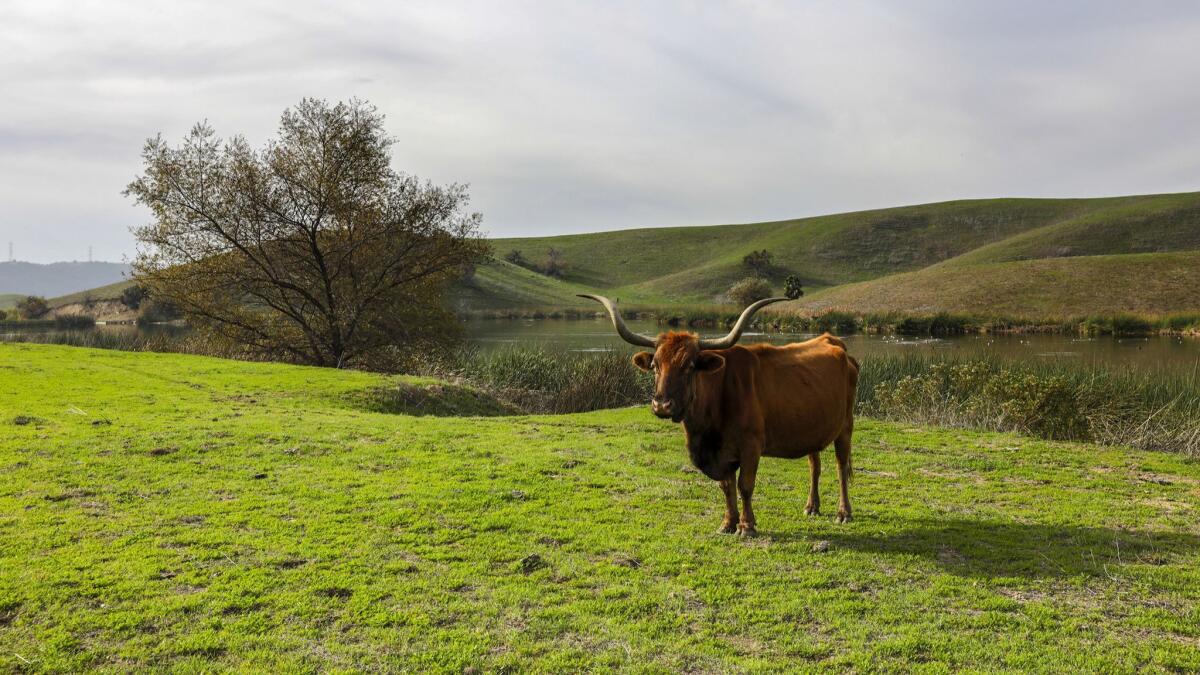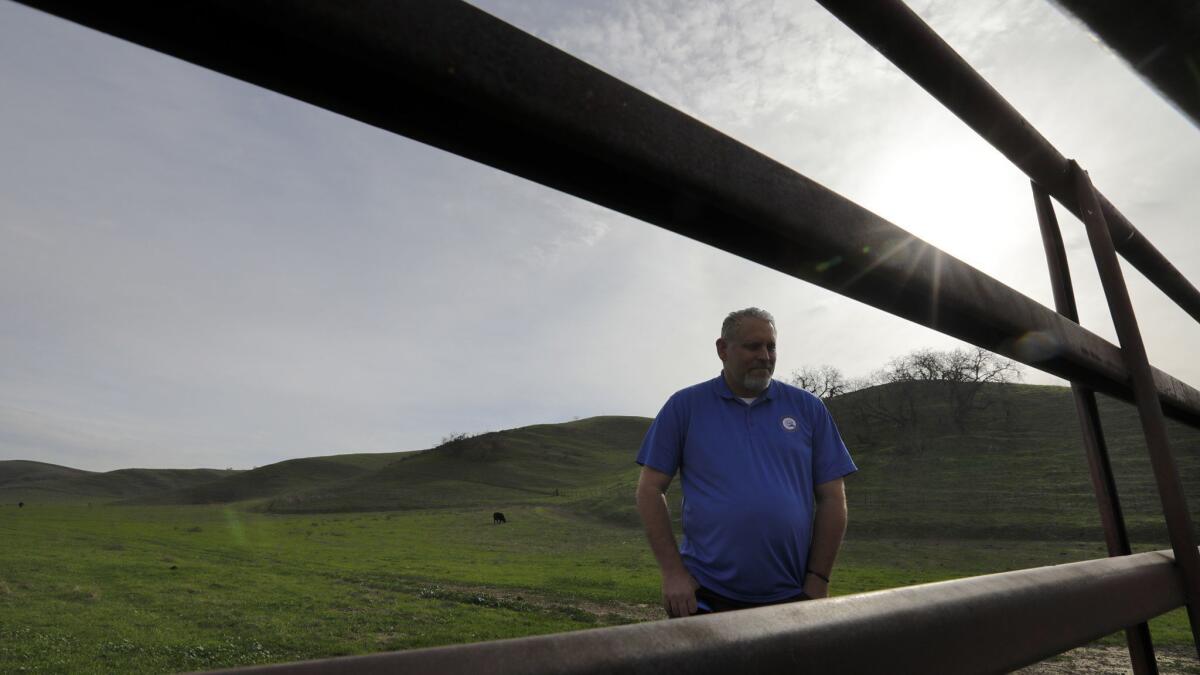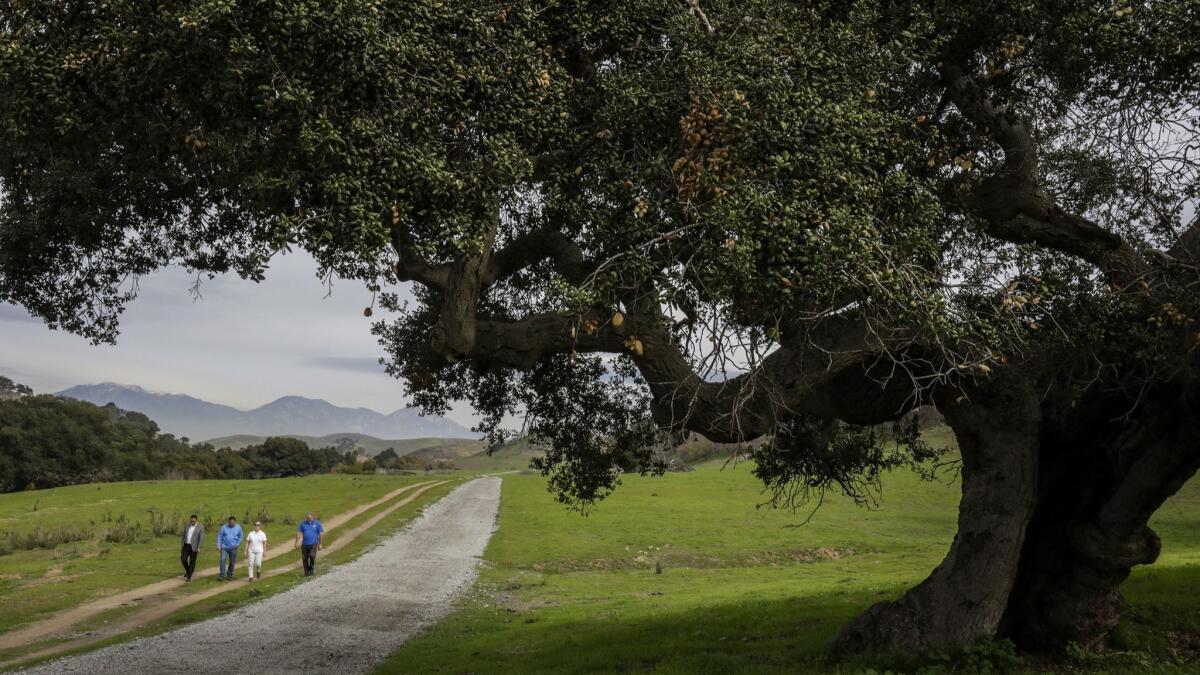Tres Hermanos Ranch is a rare glimpse at a pastoral past. But what about its future?

- Share via
The scene from the perimeter fence of Tres Hermanos Ranch is a glimpse back in time: longhorn cattle and deer roaming green fields framed by forested hills and watered by streams.
Stretching from the 60 Freeway in Los Angeles County south to the western tip of San Bernardino County, the 108-year-old ranch has survived an onslaught of highways, subdivisions and shopping centers around it.
Now, legal disputes have put a cloud over the future of the 2,450 acres, which developers see as prime property for more homes and a solar energy facility.
The combatants include the cities of Industry, Commerce, Diamond Bar and Chino Hills, and San Gabriel Valley Water & Power, a developer of renewable resources headquartered in Temecula.
When the dust settles, what will the ranch look like — and will there be any room left for wildlife?
Today, that question hangs over every square inch of Tres Hermanos Ranch, which has been off-limits to the public since City of Industry’s redevelopment agency took control of the property in 1978.
Wildlife authorities and biologists have long regarded the ranch as environmentally valuable. That’s because it is a portion of the Tonner Canyon area that connects Chino Hills State Park and the Cleveland National Forest, assuring the viability of wildlife by creating a continuous natural corridor through some of the most intensely developed areas in Southern California.

“Tres Hermanos is the most significant expanse of grassland habitat left in the Los Angeles Basin — that much we know for certain,” said Dan Cooper, a consulting biologist and expert on the plants and animals in L.A. County.
“But entry has been restricted for decades,” he said, “so much of our knowledge of the species that share the ranch comes from the sightings of contract employees and utility workers, or from just peering over the fence along its edges.”
On a recent weekday, Industry City Manager Troy Helling led a small group of visitors on a rare tour of the ranch located within the boundaries of Diamond Bar and Chino Hills.
To hear him tell it, Industry has shifted its views on the best use of the land it originally saw as a reservoir and more recently as a solar farm.
“Our goal is to resolve our legal issues with Diamond Bar and Chino Hills and then partner with them on a plan that will benefit our communities and the wildlife that lives here,” he said. “But I wouldn’t blame anybody for not believing that. The previous administration in Industry was trying to shove the solar energy project down the throats of Diamond Bar and Chino Hills.”
Some would call that an understatement. Only two years ago, Industry and San Gabriel Valley Water and Power were secretly working together on a plan to build a 450-megawatt solar facility on the ranch, which is zoned for low-density residential and commercial development, and some open space.
That deal fell apart due to a spat between Industry and the proposed solar developer.
Now it’s back to the drawing board.
“We’re working with a clean slate, and we want to be good neighbors,” said Helling, who became city manager a year ago.
“It’ll take time to persuade the skeptics,” he added. “But there’s a new administration in charge of Industry now, and it doesn’t want to see a solar energy facility or Commerce or San Gabriel Valley Water and Power on this property.”
Over his shoulders, a pair of red-tailed hawks wheeled in the sky above Tres Hermanos’ grassy slopes and black walnut woodlands, prowling for prey. Nearby, hundreds of Canada geese foraged on fields where the only sounds were the songs of meadowlarks. A coyote trotted stealthily along a creek edged with willows.

If the ranch were sealed off by development, wildlife experts warn, some species now in the region would eventually die off. Wildlife common to the state park and the national forest includes mountain lions, mule deer, coyotes, bobcats, rare western pond turtles and red diamondback rattlesnakes.
Scientists say it is also along a route used by breeding golden eagles flying between Orange County and the San Gabriel Mountains.
But a comprehensive scientific survey of the plants and animals on the ranch will not be conducted until the property is formally targeted for development. That won’t happen, officials said, until the resolution of several lawsuits.
Claire Schlotterbeck, executive director of Hills for Everyone, a Brea-based nonprofit conservation group, has relied on video footage taken from the windows of rented airplanes to better understand the potential threats to Tres Hermanos’ habitat and wildlife.
“I’ve never stepped foot on Tres Hermanos because it is guarded by fences, locked gates and armed guards on patrol at all hours,” she said. “But judging from all the video footage we’ve gathered, it’s big and broad, Irish green and teeming with an abundance of species.”
“The trouble is,” she added, “Lord only knows what comes next out there.”
Industry in 1978 purchased Tres Hermanos from the heirs of former Los Angeles Times Publisher Harry Chandler, who helped establish the ranch. The property was transferred to the city’s redevelopment agency with a goal of building reservoirs that would supply water to its factories, foundries and manufacturing businesses, about 11 miles to the west.
Pictures in the News | Friday Jan. 11, 2019 »
In 2011, California shut down redevelopment agencies statewide and the property was handed to a successor agency governed by an oversight board composed of Industry’s City Council members.
A year ago, that board directed the successor agency to sell the property, which has an estimated appraised market value of about $100 million, to Industry for $41.5 million, according to Industry officials and lawsuits filed in Superior Court by Diamond Bar and Chino Hills.
The litigation revealed that Industry had earlier partnered with San Gabriel Valley WP to draw up plans for a solar energy project at Tres Hermanos.
But that partnership was recently tabled, Industry officials said, because San Gabriel Valley Water & Power has refused to allow an audit of $20 million it claimed was spent on engineering preparations related to the solar project.
Complicating matters, Industry has yet to buy back the property from the successor agency. Now, City of Commerce has requested that the oversight board sell it the ranch instead, according to a draft agenda accidentally released by the board in November.
Meanwhile, the state controller’s office is set to release a new review finding a host of suspect transactions and lax oversight by Industry city officials, The Times reported last week.
That review is only the latest of such revelations. The city — a small municipality of over 12 square miles consisting mostly of industrial businesses and home to fewer than 300 residents — has for years contended with reports of financial mismanagement and hundreds of millions of dollars in contracts flowing to companies owned by Industry’s former mayor.
In a letter to the oversight board this month, Diamond Bar City Atty. David A. DeBerry suggested that Commerce aims to lease Tres Hermanos to San Gabriel Valley Water & Power and then cover the ranch “with solar panels to rake in millions of dollars all to the detriment of the communities of Diamond Bar and Chino Hills.”

Approval of a sale to Commerce, he warned, would “force Diamond Bar to dig deeper into the forces that have caused elected and appointed officials to perpetuate a climate of secrecy and unlawful conduct that is frankly an embarrassment.”
Commerce officials did not comment on their city’s plans.
Darcy Burke, a spokeswoman for San Gabriel Valley Water & Power, said her company “is not currently partnered with Commerce.” She added, however, that Commerce was one of several communities that have expressed an interest in working with her company at Tres Hermanos.
“Our intent is to use about 30% of Tres Hermanos for renewable energy,” she said, “and leave the rest for open space.”
In the meantime, Industry has hired Alissa Cope, a biological consultant with Sage Environmental Group, to preserve ranching as a way of life while protecting wildlife — at least for now.
“Tres Hermanos is an extraordinary landscape — and it could be even better,” Cope said, nodding at a crew installing raptor perches near where waterfowl lounged in the murky ripples of an old reservoir.
“The more biodiversity,” she added, “the healthier the habitat.”
Twitter: @LouisSahagun
Times staff writer Adam Elmahrek contributed to this report.
More to Read
Sign up for Essential California
The most important California stories and recommendations in your inbox every morning.
You may occasionally receive promotional content from the Los Angeles Times.











